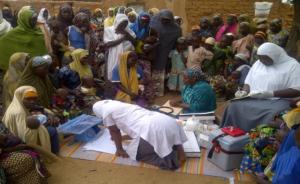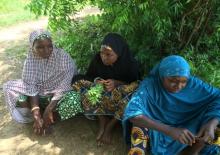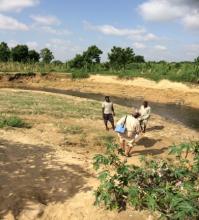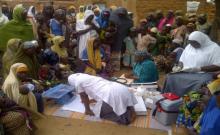Addressing Inequity of Health Service- Delivery in Northern Nigeria.
Abuja 09 September, 2014 - Every year, thousands of children mostly under five years of age die from vaccine preventable diseases in Nigeria. The National Routine Immunization Strategic Plan (2013 – 2015), stipulates that 40% of the childhood deaths are attributed to vaccine preventable diseases such as measles, neonatal tetanus, hepatitis etc. Some factors contributing to such alarming death rates is inequity in health services provision. The WHO with a grant from the Bill & Melinda Gates Foundation (BMGF) aims to put a stop to this with its Hard-to-Reach Project which targets 2311 mostly rural and remote underserved communities of northern Nigeria.
Operationalizing outreach
Using the country’s routine immunization infrastructure, the HTR project, facilitated by the WHO polio surge capacity at all levels in the states of Kano, Bauchi, Borno and Yobe, is reaching many more children and women with vaccines and other essential health services in remote areas of Northern Nigeria; where absence of health facilities, geographical distance and poor road network make it difficult to provide these services.
Since inception in May this year, the HTR programme immunized 20,533 children under-one year of age, of which a significant proportion 4,089 (19.9%) had been reached for the first time with trivalent oral polio vaccine (tOPV). In addition, 41,986 more children, 1-5 years of age were also reached with supplemental tOPV. This will contribute immensely towards stopping polio transmission in these underserved areas. Furthermore, a total of 41,497 women of child bearing have also been given tetanus toxoid injection and benefited from ante-natal checkups. The services which also include treatment of minor ailments for women and children have seen a huge turnout of people in the social-amenities deprived communities of northern Nigeria.
Among the many women who brought their children to one of the many make-shift centres for immunization was Amina Abdullahi; a 30 year old mother of four in Mallamawa village in Kano State. Amina came to know about the services a few days ago when a team from the local government health department came to visit their village to inform them of the free health services they were bringing to her village.
“I came in early to join the queue with my son who is 3 years old to receive free treatment. Although we have always had polio vaccination team coming here almost every month to vaccinate our children, this one is different because it is combined with other vaccines, free treatment for women and children. We have never had anything like this before now”, Amina who is in her early pregnancy narrated.
Recalling her last pregnancy experience Amina spoke on how her daughter died last year. “After the naming ceremony which is traditionally done 7 days after delivery, my daughter who was sucking normally began to convulse and jerk and shortly died. I don’t know what caused her death but it happened very quickly and we could not travel to the hospital because we had no money and the hospital is too far from here”. This story is all too common in many of the communities earmarked for the HTR project where physical access, poor road network, insecurity and lack of appropriate transport have made it all difficult for health care workers to provide integrated maternal child health care service.
While providing other maternal interventions, many people in the HTR communities are now more assured that their children will not only receive OPV but other routine antigens that will protect them from the disease condition that Amina’s so aptly described - neonatal tetanus.
So many hurdles to cross.
Every quarter of a year, a Mobile Health Team will visit a HTR community and provide routine immunization antigens, free antenatal checkups, drugs and free consultation to women of child-bearing age and children less than 5 years of age. The MHT which comprises of a nurse-midwife, community health extension worker (CHEW) and a health record assistant travel to scheduled HTR communities 3 times a week to offer free integrated maternal and child health services.
The mobile outreach service provides immunization against vaccine preventable diseases such as polio, diphtheria, measles, tuberculosis, tetanus toxoid, hepatitis, Heamophilus influenza type b and screens children for malnutrition. It also offers free ante natal checkups for pregnant women and treatment against minor ailments.
“Going to the HTR communities is not without challenges. Sometimes, our vehicles which most often are not meant to ply these rough roads break down and we have to trek long distances to reach our destination” says Ismaila Gwarzo one of the many Local Government Area Facilitators recruited for the project. “We are, however, comforted when we reach our destination and see the huge number of people waiting to be served” he concluded.
Over the next one year of the project, it is expected that more than 240,526 children under-five and 147,432 women of child-bearing age would have had four contacts with routine vaccine antigens and ante natal care service. Women such as Amina, who is in her early pregnancy would have received 2 ante natal care checkups and hopefully would be convinced to visit the health facility nearest to them during pregnancy.
Conclusion and Way Forward
Surely the project will contribute to addressing the issue of equity to health services in the targeted hard to reach underserved populations. It is anticipated that with demonstrated success of reducing inequity, the Government of Nigeria, at the state and LGA levels, will sustain the provision of these services to these underserved populations.
______________________________________________________________
01 Mobile Health Team
02 Women Relating Their Experiences
03 HTR Team About To Cross A Stream






